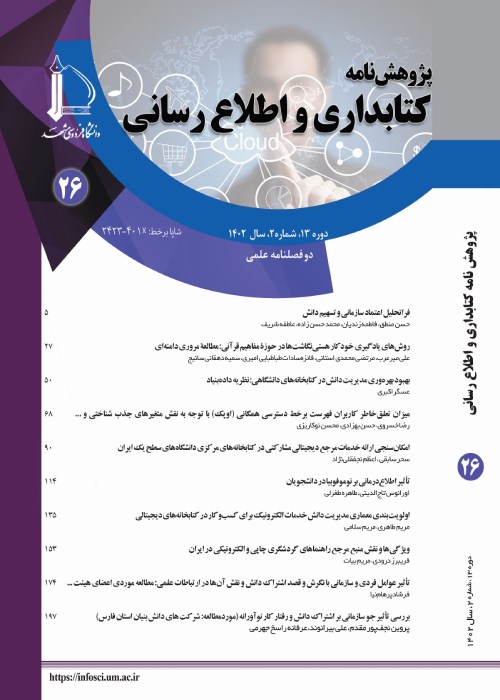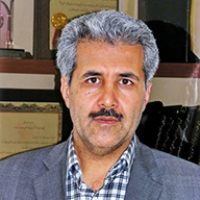Knowledge Management in University Libraries of Iran: Documentation and its Mechanisms
Author(s):
Abstract:
Introduction
Organizational knowledge is fading into oblivion due to various reasons like retirement and relocation of the managers. Documentation is able to prevent the oblivion through recording, evaluation, organization, maintenance, and dissemination of the knowledge along with the experiences of managers. The prerequisite of documentation is specifying its features. This study aimed to identify and rank the documentation mechanisms in Iranian academic libraries. Based on the investigations which have been already conducted, it seems that this research is the first study in the field of academic libraries which aims at presenting ranked mechanisms for knowledge documentation. The results of the study can be an introduction of documentation in the mentioned centers.Methodology
The method of research was survey-analytical approach and regarding to objectives was applied. The statistical population consisted of the Iranian academic libraries managers. 172 community members based on the population size and the sample table of Krejcie and Morgan, 116 people were selected through stratified random. Out of 100 distributed questionnaires 86.2 percent of them were returned. To collect the data, E-researcher-made questionnaire in the form of Likert scale was designed based on several validated questionnaires and the related available literature review. The primary questionnaire was given to the experts to determine the content validity and after necessary reforms and proposed changes by the experts; it's find version was compiled as many as 30 questionnaires was completed by the given community to determine their reliability. The scale reliability was 87.45 based on the reported Cranach's alpha coefficient. Inferential and descriptive statistics were used to describe and analyze the data. In descriptive statistics, mean, exploratory factor analysis, and Friedman Test were used. As the study deals with the viewpoints of the managers, the survey method was applied. However, it is an applied research because the results can be applied to the knowledge documentation in libraries to meet the related problems partially.FINDINGS:Necessary mechanisms for documenting knowledge on Dalkir integrated life cycle of organizational knowledge have been found. Accordingly, 11 mechanisms of capture and extraction, 9 mechanisms of assessment/selection, 7 mechanisms of codification, 8 mechanisms of refinement, 9 mechanisms of sharing, 7 mechanisms of access, 7 mechanisms of learning, 8 mechanisms of application, 7 mechanisms of evaluation, and 6 mechanisms of update identified and based on Friedman's non-parametric test and degree of importance, were ranked. It was also the most important sources of tacit and explicit knowledge based on exploratory factor analysis on three factors extraction resources and recording tacit knowledge of managers, extracting explicit knowledge to codification and representation and sources of explicit knowledge for data mining and web mining Summary and were named.
Conclusions
Knowledge documentation in Iranian academic libraries does not follow a particular model. This study proposes the required mechanisms to facilitate the documentation execution and solve the issues arising from knowledge documentation at the academic libraries. The mechanisms were identified and ranked based on the manager's viewpoints as they focus on the main features of documentation i.e., extraction, validation, modification, and dissemination of the recorded knowledge. Therefore, the results of the study have the required potentialities to be applied in libraries. Since there are a few studies in the field of knowledge documentation, related Persian and non-Persian literature was lacking in this realm. Some of the respondents had limited knowledge about the study variables. This problem was solved by providing the required definitions at the beginning of the questionnaire as well as in the postscripts. The main suggestions of the study included establishing documentation committee, appointing someone as the knowledge expert, preparing forms for recording knowledge, and formulating the documentation instructions.Keywords:
Language:
Persian
Published:
Library and Information Science Research, Volume:7 Issue: 1, 2017
Pages:
129 to 152
magiran.com/p1743848
دانلود و مطالعه متن این مقاله با یکی از روشهای زیر امکان پذیر است:
اشتراک شخصی
با عضویت و پرداخت آنلاین حق اشتراک یکساله به مبلغ 1,390,000ريال میتوانید 70 عنوان مطلب دانلود کنید!
اشتراک سازمانی
به کتابخانه دانشگاه یا محل کار خود پیشنهاد کنید تا اشتراک سازمانی این پایگاه را برای دسترسی نامحدود همه کاربران به متن مطالب تهیه نمایند!
توجه!
- حق عضویت دریافتی صرف حمایت از نشریات عضو و نگهداری، تکمیل و توسعه مگیران میشود.
- پرداخت حق اشتراک و دانلود مقالات اجازه بازنشر آن در سایر رسانههای چاپی و دیجیتال را به کاربر نمیدهد.
In order to view content subscription is required
Personal subscription
Subscribe magiran.com for 70 € euros via PayPal and download 70 articles during a year.
Organization subscription
Please contact us to subscribe your university or library for unlimited access!



